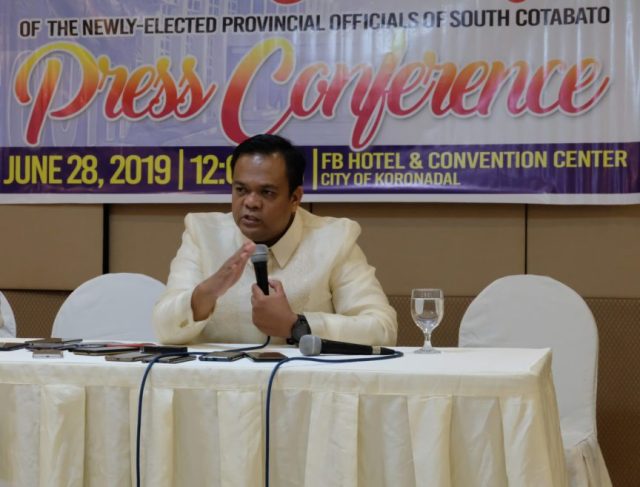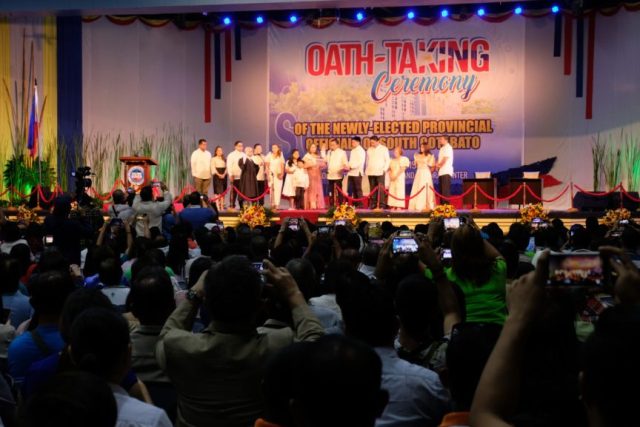New South Cotabato governor nixes open-pit mining
By Bong S. Sarmiento

Incoming South Cotabato Gov. Reynaldo Tamayo, Jr. answers questions from the media after he was sworn to office on Friday (June 28, 2019) in Koronadal City. MindaNews photo by BONG SARMIENTO
KORONADAL CITY – Incoming South Cotabato Gov. Reynaldo Tamayo Jr. said on Friday he is “not in favor of open-pit mining,” the “only” viable mining method for the controversial $5.9 billion Tampakan project, the largest known undeveloped copper and gold reserve in Southeast Asia.
Sworn to office before an estimated 5,000 people at the South Cotabato gymnasium and cultural center here, Tamayo laid down his priorities in the next three years in a speech in Filipino that lasted less than 20 minutes.
Free public education and hospitalization as well as environment protection, infrastructure development and enhancing investors’ confidence would be the centerpiece of his rule, he said.
Tamayo thoroughly discussed his first two priorities that drew the crowd’s applause, but he left out how he would protect the environment.
He also did not mention the province’s open-pit mining ban as well as the Tampakan project.
But in a press conference after the oath-taking ceremonies, Tamayo noted that he is respecting the open-pit mining ban, a key component of the province’s environment code.
“Ako indi gid ako pabor sa open-pit (mining) (I am not really in favor of open-pit mining),” the 39-year-old leader said.
In a study, Sagittarius Mines, Inc. (SMI), the operator of the Tampakan project, noted that open-pit mining method is the most viable method to extract the minerals, which lie near the earth’s surface.
The Tampakan project has the potential to yield an average of 375,000 tonnes per annum of copper and 360,000 ounces per annum of gold in concentrate over the 17 year period of mining and ore production.
The mammoth mineral reserve is concentrated in Tampakan town, hence the project was named after it.
Outgoing Gov. Daisy Avance Fuentes signed the controversial environment code that banned open-pit mining in 2010.
Tamayo, the sixth and the youngest elected governor of South Cotabato, ended Fuentes’ long reign during the hotly contested May 13 gubernatorial race.
His victory over Fuentes, who served as governor for 15 years and representative of the second district for 12 years, was the biggest political upset in this part of the country.

Incoming South Cotabato Gov. Reynaldo Tamayo, Jr. (6 from right) takes his oath of office Friday (JUNE 28, 2019) in Koronadal City, the provincial capital. MindaNews photo by BONG SARMIENTO
Tamayo was the mayor of Tupi town for three terms before wresting the province’s top post from Fuentes.
In her explanatory note on the approval of the environment code in 2010, Fuentes cited a study by a British group titled “Philippines: Mining or Food?” which warns about the drying up of lowland rivers if the Tampakan project would proceed.
However, Tamayo noted that the legality of the province’s open-pit mining ban had been challenged at a local court by a tribal group supportive of the Tampakan project.
Those who challenged the legality of the province’s prohibition on open-pit mining method argued that local laws could not supersede national laws, he said.
The Philippine Mining Act of 1995 does not prohibit the open-pit mining method, SMI had asserted.
Whatever will be the decision of the court, we will have to respect it, Tamayo said.
Constancio Paye Jr., director of the Mines and Geosciences Bureau in Region 12, said that SMI had already obtained the Free Prior and Informed Consent (FPIC) of the Certificate of Ancestral Domain Title holders in the area.
“Certification of Pre-Condition (CP) ang kukunin pa nila (they still have to get) from NCIP (National Commission on Indigenous Peoples). Pre-requisite ang FPIC sa (in the) issuance ng (of) CP,” he said in a text message.
NCIP-12 director Jeanne Anne Moendeg-Zoilo said that SMI’s CP is under process.
The FPIC is needed before mining may be allowed in ancestral lands.
Tamayo confirmed that former defense secretary Gilberto “Gibo” Teodoro, SMI chair, already paid a courtesy call to him, apparently to signify the firm’s intention to pursue the Tampakan project.
The Alcantara Group, a Mindanao-grown conglomerate, owns the controlling equity of SMI after acquiring it from Anglo–Swiss multinational commodity trading and mining firm Glencore Plc in 2015.
Source: Minda News


